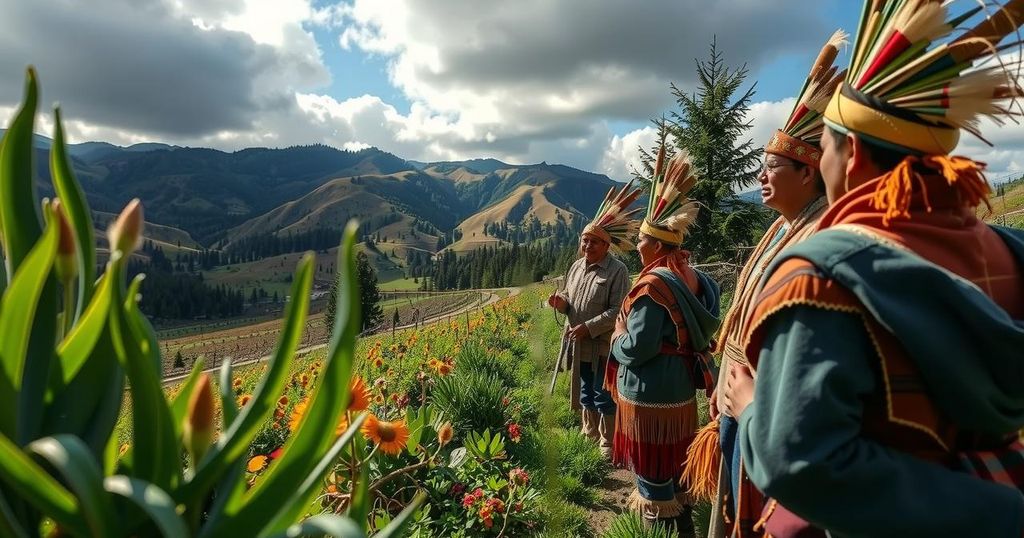Climate change
” TOUMA, ASIA, CALIFORNIA, CLIMATE CHANGE, CONSERVATION, DANIELLE TOUMA, KARUK, LEBANON, MENTAL HEALTH, MIDDLE EAST, NATIONAL CENTER FOR ATMOSPHERIC RESEARCH, NCAR, NORTH AMERICA, NORTHERN CALIFORNIA, SCIENCE, SUSTAINABILITY, TO, TOUMA, U. S, UNITED STATES, UNIVERSITY OF, UNIVERSITY OF TEXAS, AUSTIN, UNIVERSITY OF WASHINGTON, WASHINGTON
Marcus Li
0 Comments
Collaborative Efforts to Aid the Karuk Tribe in Addressing Climate Challenges
Danielle Touma, a research professor, is collaborating with the Karuk Tribe in California to integrate climate science with traditional ecological knowledge to address climate challenges, particularly wildfire risks. This partnership aims to build a climate projection framework that will empower the tribe to manage environmental risks effectively, creating a model for future collaborations with Indigenous communities.
Danielle Touma, a research professor at the University of Texas, Austin, has recently expanded her focus beyond theoretical research to engage directly with the Karuk Tribe in Northern California. Born in drought-prone Lebanon, Touma’s academic path in civil engineering and subsequent PhD in earth system sciences have uniquely positioned her to understand the implications of climate change on water resources and extreme weather events, particularly wildfires and droughts.
While working on wildfire risk modeling during her postdoctoral fellowship at the National Center for Atmospheric Research, she was invited to collaborate with the University of Washington on a project aimed at developing a hydrology model for the Karuk tribe. This opportunity prompted her to visit the tribe, where she recognized the importance of integrating her research with their cultural practices and traditional ecological knowledge.
Climate change poses significant challenges for Indigenous communities across the United States, with repercussions for traditional food sources and biodiversity. The Karuk Tribe is acutely aware of these changes as they have experienced an increase in the frequency and intensity of wildfires in their ancestral lands. Touma emphasizes the importance of tribal knowledge, stating that, “They know the minute details of how their land works.”
To assist the Karuk Tribe in addressing these climate challenges, Touma intends to create a climate projection framework that combines scientific modeling with the tribe’s observations and insights. This collaborative approach seeks to enhance the tribe’s capacity to assess and prepare for climate-related risks, such as wildfires and drought, ultimately empowering them to employ effective land management practices, including prescribed burns.
Touma expresses enthusiasm for this partnership, aspiring that her research methodology could serve as a model for future collaborations between scientists and Indigenous communities. By fostering co-creation in research endeavors, she believes that more effective strategies can be developed to mitigate the impacts of extreme weather events.
Through this collaboration, Touma hopes to honor the Karuk Tribe’s profound connection to their land while simultaneously equipping them with the tools necessary to navigate the complexities of a changing climate.
The Karuk Tribe, located in Northern California, faces significant challenges due to climate change, particularly in relation to extreme weather events such as droughts, wildfires, and heavy rainfall. These climate changes threaten traditional food sources and the ecological balance that tribes rely upon for their cultural practices and livelihoods. Indigenous communities possess extensive knowledge of their environments but are increasingly affected by the unpredictability induced by climate change. Researchers such as Danielle Touma aim to merge scientific approaches with traditional ecological knowledge to foster resilience in these communities.
In conclusion, the partnership between Danielle Touma and the Karuk Tribe exemplifies a vital step toward integrating modern scientific practices with traditional ecological understanding. By developing a climate projection framework, this collaboration seeks to empower the tribe in their management of climate risks while preserving their cultural heritage. This initiative not only aims to assist the Karuk Tribe but also aspires to establish a model for future engagements between scientists and Indigenous populations to collaboratively address the impacts of climate change.
Original Source: thestoryexchange.org




Post Comment